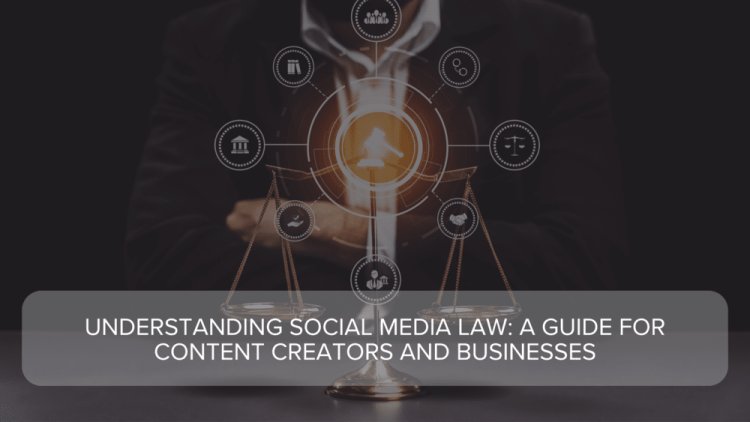Understanding Social Media Law: A Guide for Content Creators and Businesses
This guide aims to provide content creators and businesses with a comprehensive overview of social media law, highlighting key legal considerations and offering practical tips to navigate the ever-evolving landscape.
Share this Post to earn Money ( Upto ₹100 per 1000 Views )

In today’s digital age, social media has become a powerful tool for both content creators and businesses. It offers an unparalleled platform for marketing, communication, and brand building. However, with the rise of social media usage, understanding and complying with social media law has become crucial to avoid potential legal pitfalls. This guide aims to provide content creators and businesses with a comprehensive overview of social media law, highlighting key legal considerations and offering practical tips to navigate the ever-evolving landscape.
What is Social Media Law?
Social media law encompasses the legal issues that arise from the use of social media platforms. It is a dynamic field that intersects with various areas of law, including intellectual property, privacy, defamation, advertising regulations, and employment law. As social media continues to evolve, so too do the laws governing its use, making it essential for content creators and businesses to stay informed about the latest developments in social media law.
Key Legal Considerations for Social Media Use
- Intellectual Property Rights
- One of the most common legal issues in social media law involves intellectual property rights. Content creators and businesses must ensure that they have the necessary rights to use any content they post, including images, videos, music, and text. Unauthorized use of copyrighted material can result in legal action, including takedown notices, fines, and even lawsuits. To avoid infringement, it is important to obtain proper licenses or use royalty-free content.
- Privacy and Data Protection
- Privacy concerns are at the forefront of social media law. Businesses that collect, store, or process personal data from users must comply with data protection laws such as the General Data Protection Regulation (GDPR) in Europe and the California Consumer Privacy Act (CCPA) in the United States. Content creators should also be aware of the privacy settings on social media platforms to protect their own personal information and that of their followers.
- Defamation
- Defamation occurs when false statements are made about a person or business that can harm their reputation. Social media platforms are not immune to defamation claims, and content creators must be cautious about what they post online. It is important to fact-check information and avoid making unsubstantiated claims about individuals or companies to prevent potential legal action.
- Advertising and Endorsements
- The Federal Trade Commission (FTC) in the United States has specific guidelines for advertising and endorsements on social media. Content creators and businesses must disclose any material connections with brands they promote, such as sponsorships or free products. Failing to do so can lead to legal penalties. Transparent and honest communication with followers is not only a legal requirement but also builds trust with the audience.
- Employment Law
- Social media use can have implications in the workplace, and employers must establish clear social media policies. These policies should outline acceptable use of social media during work hours, confidentiality requirements, and the consequences of inappropriate conduct online. Employees should also be aware that their social media activity, even on personal accounts, can impact their employment if it violates company policies or tarnishes the employer’s reputation.
The Role of Social Media Platforms in Enforcing the Law
Social media platforms themselves play a significant role in enforcing social media law. They have community guidelines and terms of service that users must adhere to. Violating these guidelines can result in content removal, account suspension, or even permanent bans. Additionally, platforms have mechanisms for reporting and addressing legal issues, such as copyright infringement or harassment.
It is essential for content creators and businesses to familiarize themselves with the rules of each platform they use. Staying updated on platform policies and adhering to them can help mitigate legal risks.
Staying Informed: The Importance of Infotech Insights and Tech News
In the rapidly changing world of social media, staying informed about the latest developments in social media law is critical. Content creators and businesses should regularly consult reliable sources of information, such as Infotech Insights, which provides in-depth analysis of emerging legal trends in the digital space. Additionally, keeping up with tech news can help identify new regulations, case law, and best practices that may impact social media use.
Practical Tips for Compliance
- Regularly Review and Update Social Media Policies: Ensure that your social media policies are up to date and reflect the latest legal requirements. This includes privacy policies, terms of service, and advertising disclosures.
- Educate Your Team: Conduct training sessions for employees or team members on social media law to ensure everyone understands the legal implications of their online activities.
- Use Legal Disclaimers: Include disclaimers on your social media profiles and posts to clarify your legal rights and responsibilities. This can help protect against potential legal claims.
- Monitor Your Online Presence: Regularly monitor your social media accounts for any content that may violate the law or platform policies. Promptly address any issues to minimize legal risks.
Conclusion
Navigating social media law can be complex, but it is essential for content creators and businesses to protect themselves from potential legal issues. By understanding key legal considerations, staying informed through reliable sources like Infotech Insights, and implementing best practices, you can ensure that your social media presence is both legally compliant and effective. As the digital landscape continues to evolve, staying vigilant and proactive in your approach to social media law will be key to long-term success.















